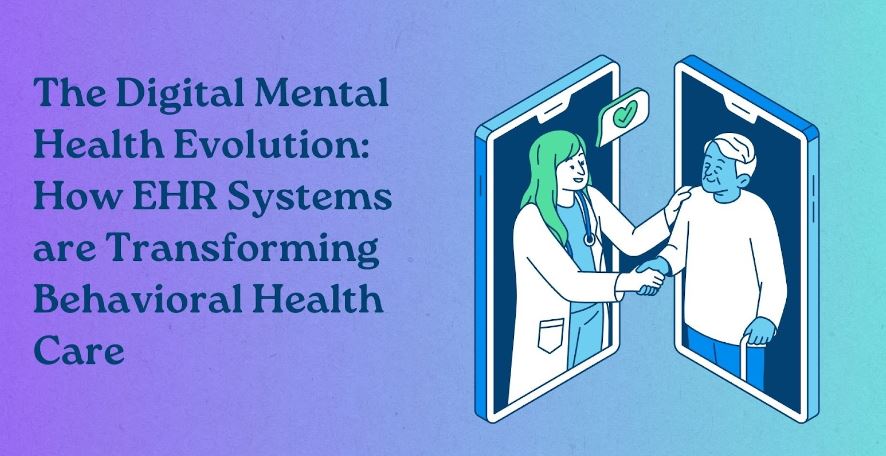Healthcare is undergoing a fascinating makeover, and it’s not just a makeover – it’s a digital revolution changing how we take care of ourselves.
From cool gadgets you wear to talking to a doctor on a screen, technology is shaking hands with healthcare, giving it a high-five, and saying: “Let’s do this differently”.
Now, imagine this wave of change reaching the world of mental healthcare, bringing with it a bag full of new tools and ideas that have the potential to make our minds feel better.
In this article, we’re diving into this exciting realm, exploring the tools and innovations that might just be the superheroes of better mental health.
- Challenges With Traditional Mental Health Records
- The Promise of Behavioral Health EHR Systems
- Key Capabilities of Modern Behavioral Health EHR Systems
- Behavioral Health Trends Enabled by Digital Evolution
- The Road Ahead: Ongoing Evolution in Mental Healthcare
- Conclusion
- Frequently Asked Questions
- 1. How can EHRs improve the coordination of care for patients seeing multiple mental health professionals?
- 2. What are some of the biggest challenges faced by behavioral health clinicians in adopting EHR systems?
- 3. How do behavioral health EHR systems aim to balance privacy with appropriate information sharing?
- 4.How might digitization impact the counseling/psychotherapy experience?
Challenges With Traditional Mental Health Records
In the bygone era of mental health, records were more than just documentation; they were paper trails woven with handwritten notes. However, this nostalgic approach came with its set of challenges that echoed through the halls of mental healthcare:
1. Data Silos
Information, akin to scattered notes in a forgotten melody, sprawled across various offices and systems, leading to a noticeable lack of coordination among healthcare providers. The lack of integrated mental health EHR software contributed to these data silos, preventing easy sharing of patient information across providers.
2. Access Issues
The reliance on paper records created a maze of challenges, making it arduous to access files from multiple locations. The echoes of shuffling papers resonated through the inefficiencies of traditional record-keeping. Mental health EHR software promised to break down these barriers, facilitating easy access to patient records.
3. Privacy Concerns
In a world of physical records, the fortress of privacy appeared fragile. Susceptible to unauthorized access and loss, the sanctity of mental health data faced a constant threat.
4. Limited Insights
Within the pages of paper records, the ability to analyze data or unveil trends remained shrouded in shadows. Extracting meaningful insights became a challenging quest for mental health professionals.
As the winds of change blow through the corridors of mental healthcare, the imperative to digitize records becomes more than just a technological trend; it becomes a beacon guiding the way toward integrated and efficient care models.
The Promise of Behavioral Health EHR Systems
Electronic Health Records (EHRs) have been gradually finding their way into mental healthcare settings over the past decade. Now, specialized Behavioral Health EHR systems are emerging as purpose-built tools designed to cater to the unique needs of mental health professionals and their patients.
1. Enhanced Coordination in the Digital Realm
All patient data consolidated into a digital system allows for seamless care coordination across multiple providers. This contrasts sharply with fragmented, siloed treatment plans of the past.
2. Improved Outcomes through Data Tracking
EHRs empower providers to track treatment effectiveness and clinical outcomes. This data-driven approach can inform interventions, fostering a more responsive and tailored approach to mental health care.
3. Security Reinvented
Digital records come with enhanced security features, including encryption, access controls, and robust backup capabilities. This addresses concerns about lost paperwork or breaches of f confidentiality.
4. Accessibility Anytime, Anywhere
Cloud-based records enable convenient access from multiple locations and devices, providing mental health professionals with critical patient data at their fingertips.
5. Insights Unveiled Through Data Analytics
Applying data analytics to aggregated EHR data can unveil trends, trajectories, and opportunities to improve care at both individual and population levels.
6. Patient Engagement Elevated
Patient portals empower consumers to actively participate in their care by providing access to records, appointment scheduling, medication refills, and communication with providers — all from the comfort of their homes.
[Source: Credible Behavioral Health]
7. Streamlined Billing Processes
Behavioral health billing, often complex, is streamlined through EHR systems. From coding to claims filing, these systems simplify the entire process.
Key Capabilities of Modern Behavioral Health EHR Systems
In the dynamic landscape of behavioral health, cutting-edge EHR platforms are leading the charge with tailored features designed specifically for mental healthcare workflows.
- Assessment Tools – Craft personalized questionnaires and scales for both initial assessments and ongoing evaluations, ensuring a tailored approach to each patient’s unique needs.
- Treatment Planning – Forge seamlessly integrated and measurable treatment plans, allowing for easy adjustments as the therapeutic journey unfolds.
- Progress Notes – Capture the essence of visits and psychotherapy sessions with the flexibility of free-text entries or the convenience of pre-built templates.
- Scheduling – Take control of provider schedules and effortlessly manage appointments online, streamlining the often intricate dance of mental health care logistics.
- Billing – Navigate the intricacies of insurance claims by electronically submitting them and stay on top of revenue cycle management with ease.
- Referrals – Simplify the process of sharing referrals and enhance communication with external healthcare providers, fostering a collaborative approach to patient care.
- Analytics – Transform raw data into actionable insights through custom reports and population health analytics, empowering informed decision-making.
- Telehealth Integration – Seamlessly conduct virtual visits, monitor patients remotely, and explore various telehealth workflows, all seamlessly integrated within the EHR framework.
- Mobile Access – Embrace the flexibility of native iOS and Android apps, allowing mental health professionals to access crucial records and tools anytime, anywhere via smartphones or tablets.
In the expansive realm of behavioral health, the adoption of purpose-built EHRs stands as a beacon of transformation, promising an integrated, collaborative, and highly effective approach to mental healthcare.
By harnessing the power of these digitally-driven tools, practitioners can navigate the complexities of their profession with increased efficiency, collaboration, and effectiveness throughout the entire treatment process.
It’s not just about managing data; it’s about empowering mental health professionals to provide holistic and impactful care to those in need.
Behavioral Health Trends Enabled by Digital Evolution
The digital transformation in mental healthcare is paving the way for new treatment models and improved outcomes:
1. Integration with Primary Care
EHR interoperability enables the seamless integration of primary care and mental health data, fostering collaboration and providing a holistic view of the patient.
2. Digital Therapeutics
Software-based treatments, such as cognitive behavioral therapy apps, are emerging as complementary tools to traditional psychotherapy. EHRs can seamlessly incorporate data from these digital therapeutic tools.
3. Telepsychiatry
Virtual visits through video conferencing are increasing access to psychiatric care. EHRs play a pivotal role in facilitating these virtual connections and sharing notes and plans between providers and patients.
4. Patient Engagement
Patients can now actively participate in their care by accessing records, scheduling appointments, completing assessments, and more, all online through patient portals integrated with EHRs.
The Road Ahead: Ongoing Evolution in Mental Healthcare
As we stride forward with digital health records revolutionizing behavioral health, there’s a journey ahead peppered with challenges. Tackling these challenges becomes the cornerstone for the perpetual evolution of mental healthcare:
1. Interoperability Quandary
The harmony of data sharing among different vendor systems remains a challenge, calling for a symphony conducted by APIs and improved standards to foster seamless integration.
2. Analytics Unveiled
In the realm of mental health, the art of building predictive models and prescriptive algorithms is still in its infancy, lagging behind other specialties. The canvas is vast, and exploration has just begun.
3. Security as the Guardian
In safeguarding behavioral health records, robust user controls, access limitations, and the vigilant trail of audits stand as the guardians of digital sanctuaries. Security isn’t just a feature; it’s the fortress.
4. Clinician Adoption
Navigating the digital realm can be a daunting odyssey for clinicians resistant to new workflows. The hurdle lies in overcoming this resistance, with training and support emerging as the guiding stars for a smooth transition.
Conclusion
As we step into the digital dawn of behavioral healthcare, a symphony of possibilities unfolds, promising to redefine the landscape of mental health outcomes through the magic of technology.
While the journey towards full integration and adoption is a road still under construction, the transformative power of EHRs and the allure of novel innovations are undeniably sculpting a brighter future for this field.
In this ongoing metamorphosis, patients and providers find themselves not just spectators but active participants, each with a stake in the profound gains that this continued transformation promises.
The canvas is alive with the hues of progress, and as the digital brush sweeps across the realm of behavioral healthcare, the echoes of positive change resonate for all to hear.
Frequently Asked Questions
1. How can EHRs improve the coordination of care for patients seeing multiple mental health professionals?
With all patient data accessible in one system, care team members can be on the same page about the treatment plan. Appointment scheduling, medication lists, progress notes, and more can be easily shared between authorized providers.
2. What are some of the biggest challenges faced by behavioral health clinicians in adopting EHR systems?
Learning new systems can have a steep learning curve. Workflows are disrupted, and documentation can feel burdensome. The lack of system integration between mental health and primary care is also an obstacle. Proper training, support, and iterative improvement of EHR tools can help drive adoption.
3. How do behavioral health EHR systems aim to balance privacy with appropriate information sharing?
Robust user controls, access limitations, and audit trailing help manage privacy while still allowing care coordination. Patients must consent to data sharing and can be given access to their own records. Overall, digital systems tend to have more ways of protecting sensitive data compared to paper notes.
4.How might digitization impact the counseling/psychotherapy experience?
While the human connection will remain integral, digital tools can augment therapy in helpful ways without being disruptive. For example, patients may complete assessments or questionnaires online in advance. Scheduling and file maintenance become easier, creating more time to focus on the patient interaction.




